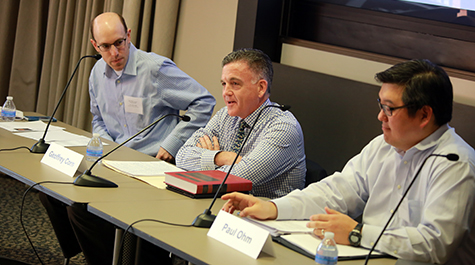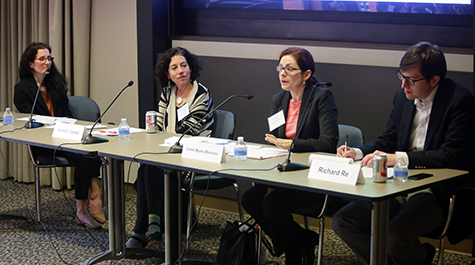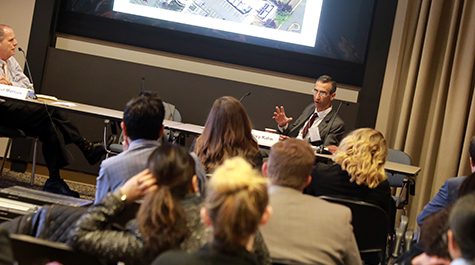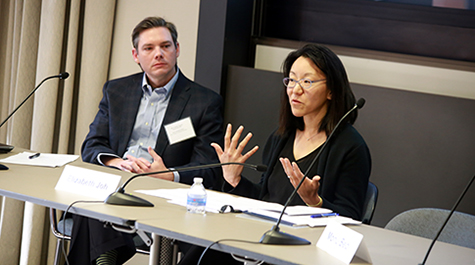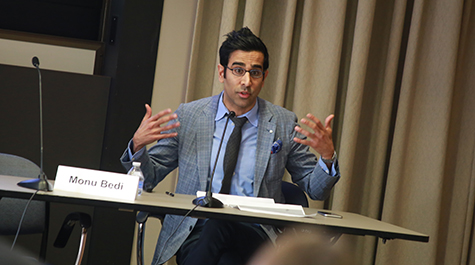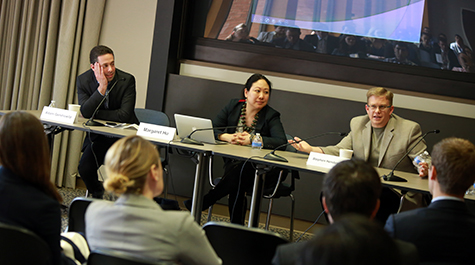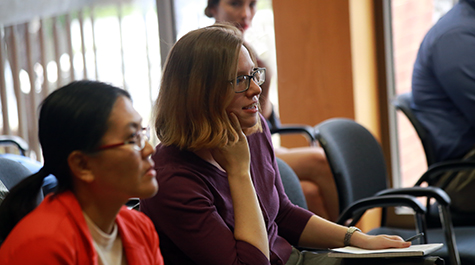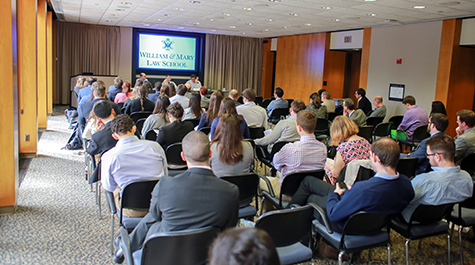Annual BORJ Symposium Examines Big Data and National Security
This year’s William & Mary Bill of Rights Journal symposium on March 24-25 was rife with terminology straight from the headlines, with attendees regularly bringing up everything from encryption to dark spaces to cyber policing.
Not surprising for a conference entitled “Big Data, National Security and the Fourth Amendment.”
“We framed the conference rather broadly,” said Adam Gershowitz, Associate Dean for Research and Faculty Development and Professor of Law at William & Mary, in his opening remarks. “The Fourth Amendment, big data, and national security are fairly large concepts, but they’re designed for cutting-edge people in the field.”
And the symposium was indeed cutting edge. Experts from across the country joined several William & Mary faculty in addressing such topics as “Encryption and Dark Spaces: The Stakes and the Role and Responsibility of Private Actors,” “National Security and Cyberspace,” “Power and the Constraints of Police in an Age of Big Data,” and “Cyber Policing.
“The symposium provided a timely discussion of the impacts of emerging technology and the legal doctrines affecting big data and national security,” said Ben Ellis, Executive Articles Editor for the Bill of Rights Journal. “The Journal was honored to host this group of distinguished scholars and grateful for their contributions.”
During the course of the two-day event, panelists emphasized the significance of new technology and the lessons learned from past litigation. They also pointed toward how the law might develop to address new technology and the rapidly growing concern for individual privacy interests.
“This was a terrific group of scholars working on some terrifically hard problems—how to reconcile national security, policing, privacy, and liberty in the modern age,” said panelist Stephen Henderson, Judge Haskell A. Holloman Professor of the University of Oklahoma College of Law, on his blog. “It was a great pleasure to brainstorm and debate different conceptions, and there is no more appropriate and beautiful location for such a gathering than America’s oldest law school.”
For William & Mary law students, the symposium provided an engaging venue for issues—the “No Fly List,” for instance—that create material problems for impacted persons and illustrate how Constitutional liberty interests must be weighed against national security.
“As the breadth and scope of technology continues to expand, understanding how the Constitution applies to related privacy concerns will only continue to increase in relevance,” said Kathryn Broderick J.D. ’18. “It was wonderful to have the opportunity to discuss areas of law that are only going to continue to increase in relevance as we move into our own practice as legal professionals.”
The Bill of Rights Journal will publish articles from the symposium in its December 2017 issue.
“With articles from many of the nation’s leading experts on the Fourth Amendment, big data, and national security, we believe the issue will make significant and lasting contributions to scholarship in this area,” said Ben Ellis.
About the William & Mary Bill of Rights Journal
Named among the leading student-edited constitutional law journals by Washington and Lee’s law library, the William & Mary Bill of Rights Journal is published in four issues per annual volume, adding 1,400 pages to the Institute of Bill of Rights Law’s scholarly corpus each year. Containing both student-edited professional articles and student-written notes, the Journal selects its student members based on performance in the Law School's Joint Journal Competition.
Each year, as the Institute sponsors symposia on topics of contemporary constitutional significance, leading scholars from around the nation assemble at the School of Law to present papers and debate their merits. Subsequently, these papers are published in the Journal, making these symposia one of the most significant academic forums for the publication of scholarship on the Constitution and the Bill of Rights.
About William & Mary Law School
Thomas Jefferson founded William & Mary Law School in 1779 to train leaders for the new nation. Now in its third century, America's oldest law school continues its historic mission of educating citizen lawyers who are prepared both to lead and to serve.
